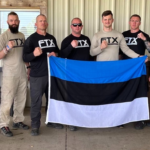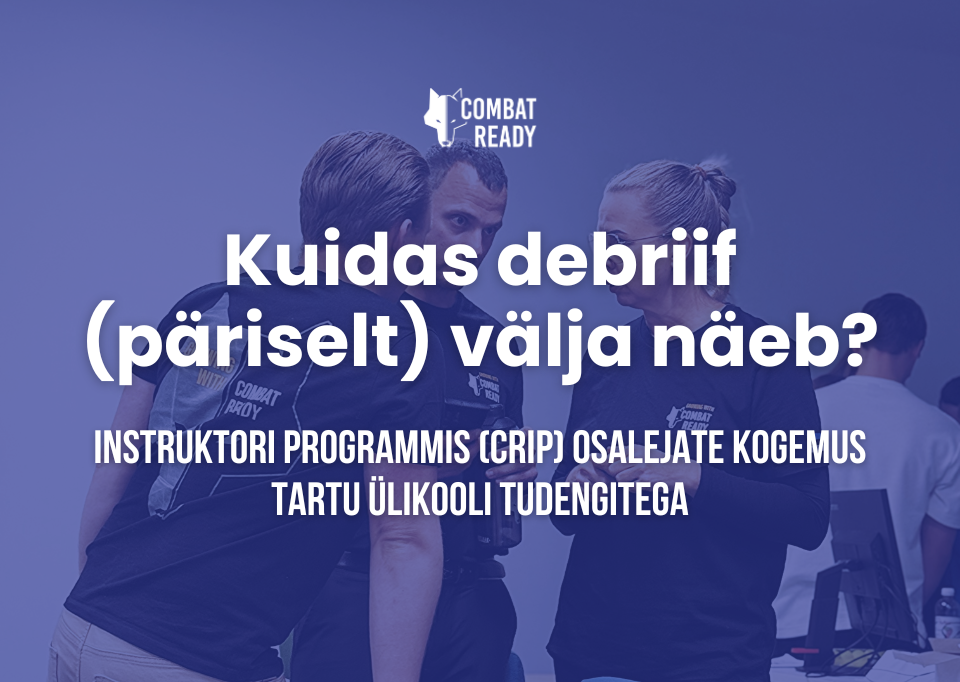
What are the real gains of the hands-on leadership training FTX?
September 14, 202210 Questions – Who is Remo Ojaste?
1. How would your friends describe you?
Calming. I try to be calm, which in turn seems to calm other. Fun. Active. A little intense 😀

2. One piece of life wisdom or event which has changed your life?
I have several:
- When something goes wrong, I think GOOD. Watch what I mean on the Jocko Podcast. Failing is part of life and you shouldn’t let it bother you too much, no matter how big the failure.
- A single hole is never too deep to pull yourself out of. If you think it is, then you need to zoom your perspective out further. There is no solution inside the problem. To solve a problem, I need to see the bigger picture. Being able to detach in these situations is a superpower:
- take a step back
- breath
- look around
- make a call
- When you set goals for your life, it’s impossible to know exactly where you’ll be in two or five years’ time. Life is usually changing so fast that it is difficult to predict accurately. However, it is still possible to stay on track. Years ago, I was constantly making mistakes as I tried to gauge the speed I was achieving my bigger goals. Rather than benefiting me, it just caused me more stress. I discovered that it is possible to assess the direction. If I focus on doing the right things in this moment, the bigger picture will work itself out. The more I focus on the current activities needed to achieve the end result, the faster I will get there. I find this allows me to take the pressure off myself. I am doing everything I can in this moment. That’s why I feel right now I’m on the correct path and happy with myself.
- For example: if I want to go from Tartu to Tallinn. I concentrate on the turns in the road and remember that Tallinn is somewhere to the north. From time to time I can stray from my path, and that’s perfectly OK. Occasionally I check that I’m still heading north, changing my actions and direction if necessary. It’s unrealistic to predict the most direct route and the time it will take to get to Tallinn, as I can’t predict what might happen along the way. And something will go wrong, but don’t worry about that. I know that every obstacle is surmountable, and by focusing on one step at a time and taking steps in the right direction, I will eventually reach Tallinn.
- Going to work is like going to school, and the salary is a reward I get for my academic achievements.
3. What is the one thing which makes you special?
In my life, I have been able to do what I want. I havn’t had a job I didn’t like or didn’t want to do. Sometimes I think I’ve never been to work, because in reality every job I’ve had has been like going to school and learning something new. Somehow I always understood that if I “get after it” then I will improve more.
The real learning in life starts when we leave school. Somehow I’ve seen that not many people think like that when they’re working. It’s as if learning has to take place within the working day, and if you ‘work too hard’ you burn out. It seems a bit funny to me, because in primary school right up to the highest levels of university study, you are in class or lectures for 8 hours and then you do homework or independent study. I have applied the same mindset at work and at home since leaving the Defence Forces. If the children can learn after the school day, I can also develop myself professionally after the work day ends.
This increases the chances of new opportunities, of being in the right place at the right time, and of being ready to take advantage of that.
4. If you could have dinner with anyone from history, who would it be and what would be the topic of conversation?
Joe Rogan – He was one of the first people I started listening to after leaving the Defence Force. His podcast has been one of the biggest eye-openers for me.
I would talk to him about whatever was in my head at the moment . I’ve already spent thousands of hours listening to his podcasts. I listen to the podcast to understand his interveiw technique, and by the end I feel like I know him pretty well 🙂 Most of all, I appreciate Joe’s open-mindedness and humility. He doesn’t see himself as better than others, but is genuinely interested in other people. I think that’s why his podcast is one of the most popular in the world.
The day I would have dinner with him would be a very cool day.
If I had to pick someone from history, it would be my grandfather Kalev Ojaste – He lived through such crazy times for himself and for our country and he died when I was quite young. He was a champion athlete for the Soviet Union, meeting the Olympic standard in several disciplines. Back in the Soviet days there was no special equipement. He started these activities in Siberia.
He didn’t start complaining, but found a way to express himself. Today, I regret that when I was young, I didn’t know how to look at him in that way and ask him for advice.
5. What are the qualities that help you recognise your “people”?
They’re a bit mad! (laughs) They have made a difference in their lives and stand out from the everyday person. They have interesting ideas and are not arrogant or uppity. Good communicators who don’t shy away from challenges. They have their own opinions and are interesting characters.
6. Is there a product/service you can’t imagine your life without?
The supermarket. Life would be much more complicated if the only way to eat was to hunt and gather berries.
7. What do you do when things get tough, i.e. what “tools” do you use?
- GOOD.
- The leadership principles we teach in our trainings – Cover & Move, Simple, Prioritize & Execute, Decentralized Command If I had to pick the most useful tool then it would be the ability to “detach“. This tool is most useful when you need to make a lot of changes to your plans quickly. If you haven’t had a proper rest and there are a lot of changes with little time to make decisions, you’re going to crash pretty fast. You don’t have a clue what to do next and you feel things are getting out of hand. For me, the easy way out of such a crisis is to take a step back, calm down, look around and move forward in the right direction.
8. What does the word leader mean to you?
This means someone who is humble, communicates well and takes ownership of their life. Someone who doesn’t have to say: “Follow me!”, people just want to follow.
9. How to find a balance between living in the moment and achieving goals/dreams? Are these things any different?

You have to dream, but you shouldn’t focus too much on them. When dreams are very ambitious, we never know if they will come true. Dreams for me are the same as goals. Focus on one step at a time, keeping the bigger picture in mind.
I think the balance is always changing. The travelling from Tartu to Tallinn example applies again. Sometimes we are on one side of the road, sometimes on the other. If you were walking down the road, you wouldn’t learn anything new. In order to evolve, you have to be able to put yourself in a situation that is at one extreme or the other. Nothing happens in the middle ground. In my opinion, it is possible to live in the moment when you are surrounded by the right people with the same values, similar ambitions and healthy differences.
Plus, it’s in the moment that all the action happens, that’s where you make mistakes and feel like you’re really living. From my experience in the Special Forces and various mentally and physically gruelling ordeals, I have come to realise that we always underestimate our own abilities and where we can really go. If you’ve been walking in the right direction for ten years, you wil lend up in place you never imagined. At first, your dreams might seem impossible, but getting to the moon also seemed impossible at first.
10. Why are you doing what you are doing today? (i.e. why was Combat Ready created and which part of it is your favourite)?
It’s close to my heart and makes me feel like I’m actually doing something useful. Delivering training also helps me to develop myself and allows me to support and meet new people who want to develop themselves.
My main experience has come from the Defence Forces. After becoming a civilian, I have felt that it was the previous foundation of the Defence Forces that has helped me become successful. Today, I am convinced that if it has benefited me, and it can benefit others.
Jocko’s principles, combined with our experience and background, provide a whole new perspective on leadership. I think the only way to truly know how our leadership courses will benefit you is to try them.




